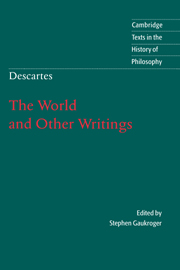Book contents
- Frontmatter
- Contents
- Acknowledgements
- Introduction
- Chronology
- Further reading
- Note on the texts
- The World and Other Writings
- The Treatise on Light
- Discourse 2 of the Dioptrics
- Discourse 8 of the Meteors
- The Treatise on Man
- Description of the Human Body
- Index
- Cambridge texts in the history of philosophy
The Treatise on Light
Published online by Cambridge University Press: 17 December 2009
- Frontmatter
- Contents
- Acknowledgements
- Introduction
- Chronology
- Further reading
- Note on the texts
- The World and Other Writings
- The Treatise on Light
- Discourse 2 of the Dioptrics
- Discourse 8 of the Meteors
- The Treatise on Man
- Description of the Human Body
- Index
- Cambridge texts in the history of philosophy
Summary
On the difference between our sensations and the things that produce them
In putting forward an account of light, the first thing that I want to draw to your attention is that it is possible for there to be a difference between the sensation that we have of it, that is, the idea that we form of it in our imagination through the intermediary of our eyes, and what it is in the objects that produces the sensation in us, that is, what it is in the flame or in the Sun that we term ‘light’. For although everyone is commonly convinced that the ideas that we have in our thought are completely like the objects from which they proceed, I know of no compelling argument for this. Quite the contrary, I know of many observations which cast doubt upon it.
As you know, the fact that words bear no resemblance to the things they signify does not prevent them from causing us to conceive of those things, often without our paying attention to the sounds of the words or to their syllables. Thus it can turn out that, having heard something and understood its meaning perfectly well, we might not be able to say in what language it was uttered. Now if words, which signify something only through human convention, are sufficient to make us think of things to which they bear no resemblance, why could not Nature also have established some sign which would make us have a sensation of light, even if that sign had in it nothing that resembled this sensation? And is it not thus that Nature has established laughter and tears, to make us read joy and sorrow on the face of men?
- Type
- Chapter
- Information
- Descartes: The World and Other Writings , pp. 3 - 75Publisher: Cambridge University PressPrint publication year: 1998
- 4
- Cited by

